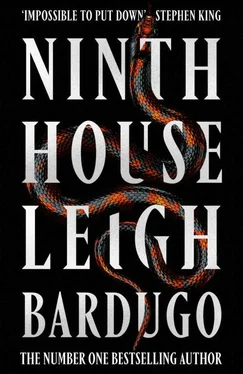Hurriedly, Alex turned off the headlights and the engine. If someone was here, if something was here, she didn’t want to scare it away.
Her boots on the gravel drive sounded impossibly loud but she wasn’t sneaking—no, she wasn’t sneaking; she was just walking up to the kitchen door. She had the keys in her hand. She was welcome here.
It could be his mom or dad , she told herself. She didn’t know much about Darlington’s family, but he had to have one. Another relative. Someone else Sandow had hired to look after the place when Dawes was busy.
All of those things were more likely, but… He’s here , her heart insisted, pounding so hard in her chest she had to pause at the door, make herself breathe more steadily. He’s here. The thought pulled her along like a child who had hold of her sleeve.
She peered in through the window, safe in the dark. The kitchen was all warm wood and patterned blue tiles— the tiles are Delft —a big brick hearth and copper pots gleaming from their hooks. Mail was stacked on the kitchen island, as if someone had been in the middle of sorting it. He’s here.
Alex thought of knocking, fumbled with the keys instead. The second one turned in the lock. She entered, gently shut the door behind her. The merry light of the kitchen was warm, welcoming, reflected back in flat copper pans, caught in the creamy green enamel of the stove that someone had installed in the fifties.
“Hello?” she said, her voice a breath.
The sound of the keys dropping onto the counter made an unexpectedly loud jangle. Alex stood guiltily in the middle of the kitchen, waiting for someone to chastise her, maybe even the house. But this was not the mansion on Orange with its hopeful creaks and disapproving sighs. Darlington had been the life of this place, and without him the house felt huge and empty, a shipwreck hull.
Ever since that night at Rosenfeld Hall, Alex would catch herself hoping that maybe this was all a test, one given to every Lethe House apprentice, and that Dawes and Sandow and Turner were all in on it. Darlington was in his third-floor bedroom hiding out right now. He’d heard the car in the driveway. He’d raced up the stairs and was huddling there, in the dark, waiting for her to leave. The murder could be part of it too. There was no dead girl. Tara Hutchins would come waltzing down the stairs herself when this was all over. They just had to be sure Alex could handle something serious on her own.
It was absurd. Even so, that voice persisted: He’s here.
Sandow had said he might still be alive, that they could bring him back. He’d said all they needed was a new moon, the right magic, and everything would be the way it had been before. But maybe Darlington had found his own way back. He could do anything. He could do this.
She drifted farther into the house. The lights from the driveway cast a yellowy dimness over the rooms—the butler’s pantry, with its white cupboards full of dishes and glasses; the big walk-in freezer, with its metal door so like the one at the morgue; the formal dining room, with its mirror-shine table like a dark lake in a silent glade; and then the vast living room, with its big black window looking out over the dim shapes of the garden, the humps of hedges and skeletal trees. There was another, smaller room off the main living room, full of big couches, a TV, gaming consoles. Len would have wet himself over the size of the screen. It was very much a room he would have loved, maybe the only thing he and Darlington had in common. Well, not the only thing.
Most of the rooms on the second floor were closed up. “This was where I ran out of money,” he’d told her, his arm slung across her shoulders, as she’d tried to move him along. The house was like a body that had cut off circulation to all but the most vital parts of itself in order to survive. An old ballroom had been turned into a kind of makeshift gym. A speed bag hung from the ceiling on a rack. Big metal weights, medicine balls, and fencing foils were stacked on the wall, and heavy machines loomed against the windows like bulky insects.
She followed the stairs to the top floor and wound her way down the hall. The door to Darlington’s room was open.
He’s here. Again, the certainty came at her, but worse this time. He’d left the light on for her. He wanted her to find him. He would be sitting in his bed, long legs crossed, bent over a book, dark hair falling over his forehead. He would look up, cross his arms. It’s about time.
She wanted to run toward that square of light, but she forced herself to take measured steps, a bride approaching an altar, her certainty draining away, the refrain of He’s here shifting from one step to the next until she realized she was praying: Be here, be here, be here.
The room was empty. It was small compared to the lodgings at Il Bastone, a strange round room that had clearly never been meant to be a bedroom and somehow reminded her of a monk’s chamber. It looked exactly as she had last seen it: the desk pushed against one curved wall, a yellowing newspaper clipping of an old roller coaster taped above it, as if it had been forgotten there; a mini-fridge—because of course Darlington wouldn’t want to stop reading or working to go downstairs for sustenance; a high-backed chair placed by the window for reading. There were no bookshelves, only stacks and stacks of books piled at varying heights, as if he had been in the process of walling himself in with colored bricks. The desk lamp cast a circle of light over an open book: Meditations on the Tarot: A Journey into Christian Hermeticism.
Dawes. Dawes had come to see to the house, to sort the mail, to take the car out. Dawes had come to this room to study. To be closer to him. Maybe to wait for him. She’d been called away suddenly, left the lights on, assumed she’d be back that evening to take care of it. But Alex had been the one to return the car. It was that simple.
Darlington was not in Spain. He was not home. He was never coming home. And it was all Alex’s fault.
A white shape cut through the dark from the corner of her vision. She leapt backward, knocking over a pile of books, and swore. But it was just Cosmo, Darlington’s cat.
He prowled the edge of the desk, nudging up against the warmth of the desk lamp. Alex always thought of him as Bowie Cat because of his marked-up eye and streaky white fur that looked like one of the wigs Bowie had worn in Labyrinth. He was stupid affectionate—all you had to do was hold your hand out and he would nuzzle your knuckles.
Alex sat down on the edge of Darlington’s narrow bed. It was neatly made, probably by Dawes. Had she sat here too? Slept here?
Alex remembered Darlington’s delicate feet, his scream as he’d vanished. She held her hand down, beckoning to the cat. “Hey, Cosmo.”
He stared at her with his mismatched eyes, the pupil of the left like an inkblot.
“Come on, Cosmo. I didn’t mean for it to happen. Not really.”
Cosmo padded across the room. As soon as his small sleek head touched Alex’s fingers, she began to cry.
Alex slept in Darlington’s bed and dreamed that he was curledbehind her on the narrow mattress.
He pulled her close, his fingers digging into her abdomen, and she could feel claws at their tips. He whispered in her ear, “I will serve you ’til the end of days.”
“And love me,” she said with a laugh, bold in the dream, unafraid.
But all he said was, “It is not the same.”
Alex woke with a start, flopped over, gazed at the sharp pitch of the roof, the trees beyond the window striping the ceiling in shadow and hard winter sun. She’d been scared to try fiddling with the thermostat, so she’d bundled herself in three of Darlington’s sweaters and an ugly brown hat she’d found on top of his dresser but that she’d never seen him wear. She remade the bed, then headed downstairs to fill Cosmo’s water dish and eat some fancy nuts-and-twigs dry cereal from a box in the pantry.
Читать дальше

![Лей Бардуго - Тень и кость [litres]](/books/25543/lej-bardugo-ten-i-kost-litres-thumb.webp)
![Лей Бардуго - Продажное королевство [CROOKED KINGDOM]](/books/31160/lej-bardugo-prodazhnoe-korolevstvo-crooked-kingdom-thumb.webp)




![Лей Бардуго - Король шрамов [litres]](/books/405552/lej-bardugo-korol-shramov-litres-thumb.webp)
![Лей Бардуго - Язык шипов [litres]](/books/415143/lej-bardugo-yazyk-shipov-litres-thumb.webp)


![Лей Бардуго - Чудо-Женщина. Вестница войны [litres]](/books/427404/lej-bardugo-chudo-zhenchina-vestnica-vojny-litres-thumb.webp)
